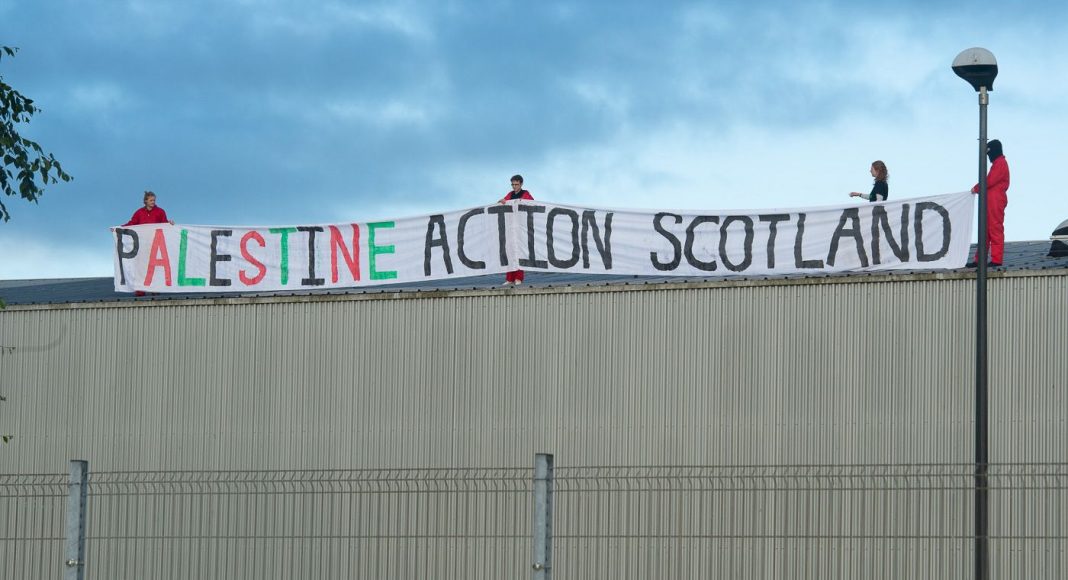On 20 August, four comrades and I, known as the Thales 5, were sentenced to 12-14 months for our direct action in 2022 against Israel’s war machine. The sentence broke precedent in the Scottish judicial system, jailing us for the minor offence of breach of the peace. We are among 16 political prisoners of Palestine Action across Britain at present, and 41 political prisoners in total from various movements including Just Stop Oil.
The new Labour government has declared its commitment to the status quo. Keir Starmer, presenting himself as a former human rights lawyer, emphasises that peaceful protestors should face the ‘full force of the law’. Lord Walney, a known arms and oil industry lobbyist, sits as the so-called independent advisor to the government on political violence and disruption. And an alliance of hard line judges has increasingly restricted the rights of defendants and juries. So the imprisonment of political activists is set to continue.
Structures have been set up such as Rebels in Prison Support (RIPS) with a focus on wellbeing and financial support. Fight Racism! Fight Imperialism! has long provided political prisoners with alternative news and reading material. But comrades facing prison in growing numbers and for longer sentences should prompt discussion on how to limit the impact of the state’s disruptive tactics.
During the Irish Republican struggle of the 20th century, prison became a hub not only of well documented resistance but also of education. Long Kesh internment camp became known as the ‘University of Freedom’, where political prisoners studied revolutionary struggles from around the world seeking lessons to apply to their own struggle. Alongside this internationalist focus, future Sinn Fein leader Gerry Adams and others initiated studies of Irish history, theorists and writers.
At the end of 1956, the South African apartheid regime arrested over 150 freedom fighters in what became the Treason Trial, finally resulting in the acquittal of all accused nearly five years later. The movement’s political leaders had been subject to severe ‘banning’ orders, curtailing their right to freely associate with one another, but their joint incarceration enabled the largest meeting of the Congress Alliance in years to take place within the confines of Johannesburg prison. The prisoners collectively organised a daily programme of activities which included physical training, history lectures and freedom song workshops. Robben Island, where Nelson Mandela and countless other freedom fighters were imprisoned in the years after, also became known as ‘The University’. As generations of comrades met and interacted for the first time, courses of study were designed to deepen one another’s education; with syllabuses focussing on the African National Congress, the Indian struggle and Marxism.
In prison, time is in abundance. Such conditions would be a precious luxury to any revolutionary, or indeed anyone, under different circumstances. In Barlinnie, where I am held, outside of recovery programmes and very limited education spaces, the only escape from 22-23 hours a day locked inside a cell is to find work. Available to less than half of us, it is prisoners that keep the prison running. Conducting essential maintenance and service such as cooking, cleaning, painting, laundry or waste management for slave wages. In my case for 50p an hour.
Past struggles have taught us that battles against capitalism, imperialism, apartheid or genocide aren’t confined to existing outside the prison walls. Struggles have been fundamentally altered from inside prison. This gives clear incentive to provide political prisoners with every tool that can be made available to learn and develop knowledge and skills that could change our fortunes for the better. Creating a new wave of organisers, trainers, recruiters and speakers, capable of inspiring and leading a revolutionary mass movement. Strategy and structures must be put in place to work out the means of delivering the resources needed for political prisoners to expand their minds, horizons and insights. But as revolutionary Black Panther Fred Hampton said, ‘Theory’s cool, but theory with no practice ain’t shit.’ And few circumstances are as appropriate for practice as within prison. Where intolerable conditions and a void of democratic input for prisoners have fuelled a rich history which continues today of both collectively organised and unorganised individual resistance. Encompassing hunger strikes, go-slow working, dirty protests, riots, targeted violence and escape attempts.
Organising within prison is no small challenge but it is essential to improve the rights and conditions of prisoners and serves to lift up the whole of society from the ground up.
Stuart Bretherton #164726
HMP Barlinnie, 81 Lee Ave,
Glasgow G33 2QX
FIGHT RACISM! FIGHT IMPERIALISM! 303 December 2024 /January 2025




